In 2021, I started working for a non-profit organization that puts on fun community events for adults with special needs, specifically with intellectual/developmental disabilities. Through that I became a primary and respite (gives the primary a break) Independent Care Provider who goes to people with special needs’ homes and provides care, does meal prep, and takes them out for exercise, to run errands, or to hang out at coffee shops. I recently became officially Home Care Aide Certified by passing the required state exams!
When people hear about what I do, they often say, “I could never do that!” Before I was hired, my boss asked me to first visit a gathering and see how I felt, because some people find it incredibly awkward to even try to make conversation, and she didn’t want me to step into something I’d be completely uncomfortable with. I didn’t have reservations though; I am quiet at first, but it makes me a good listener and then I know better how to engage specific people well. After the first visit, I reported back that I felt it was a good fit, and I was hired to lead two small groups of about twelve people each that met once a month for a Bible study and a second meeting per month for an activity. Now, I just lead one ASL group once per month.
My experience has been such a unique blessing, I feel strongly that while everyone need not lead twenty-four people four times a month in activities, everyone1 would benefit from having at least one friend in their life who has a developmental disability who they hang out with at least a few times throughout the year, if not more. I understand the meaning behind the - “I could never do that!” statement - because there are hundreds of jobs I could not do, and the thought of interacting with people with disabilities can seem intimidating at first. I hope the following insights make it easier for you, reader, to step out and connect with someone with a developmental disability (or other special need).
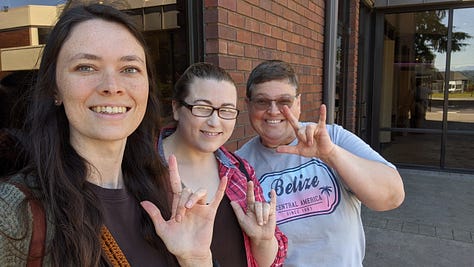
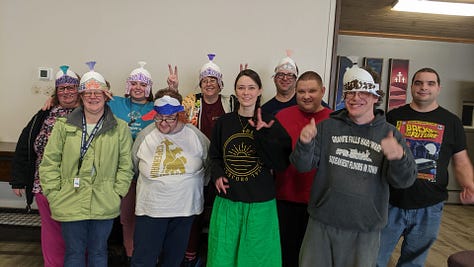
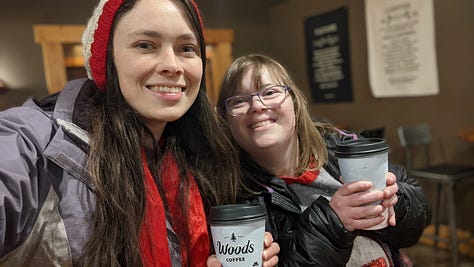
Something we say during our volunteer training, before an event, is, “Speak to the guests like they are adults, since everyone coming is an adult. Don’t baby-talk them (by using a higher pitched voice and sing-song-y lilt), you never know, you might be speaking to a caregiver and receive an awkward look in response.” Adults with developmental disabilities represent a diverse range of what age they may represent developmentally or intellectually. Sometimes it helps me to view what a person’s developmental age may be as I may choose to keep my phrasing simple (without too many idiomatic phrases or sarcasm), to speak slower, or to focus on using yes or no questions. Often though, it’s best not to assume and I just use my normal tone of voice, until I get to know them. There are some people who respond better to a more animated voice as you would talk to a younger child (say kindergarten age), there are some who crack their own puns and can be sarcastic right back. An important, and actually mutually entertaining skill to develop, is that of a chameleon. Not in the sense of being someone you’re not, but as a way of finding fun or unique ways to connect with them by getting on their level. It can be more exhausting to “put on a mask,” but it’s worth it when you make them smile or see their eyes light up. I use the phrase, “put on a mask,” because that is how it feels at times for my specific personality. As one who is quieter, I need to become more animated to get on someone’s level who responds well to that. I love being animated and silly, but it’s not who I am all the time, yet sometimes I act that way for longer than I would if I was with people my age who did not have a disability. On the other hand, with some people, me being mellow is a gift that helps them feel they are able to relax and be seen for who they are.
Being the quiet gal that I am, I leave space for the person to open up first, then I engage by their lead. I could ask, “What have you been up to lately?” Many are fine with open ended questions and respond with what can turn into a long conversation about their hobbies, health, family happenings, and even politics. Popular topics include past experiences they’ve had with bullying when they were in school, how hard it has been to find jobs, or trying to lose weight and eat healthy. These are opportunities to let them know they’re seen and heard. I usually don’t offer advice unless there’s a clear opportunity to, and I know them well, instead I reinforce with positive comments whatever healthy thing they are doing about their situation. I ask what they’re already doing about it, and offer encouragement such as, “That’s really hard, it sounds like you and your job coach are trying everything possible, keep going, you’re doing a great job.” The people we serve respond really well to positive feedback.
Most individuals come to our events with a caregiver or family member. So, for people who may be more difficult to understand, don’t be afraid to ask, “What did you say?” And often you can expect their caregiver to jump in with added context. You can also get the attention of the caregiver (say they were talking with someone else or looking at their phone) and ask, “What did [person’s name] say?” Then look back to the individual and respond directly to them. Most of them time, the person is excited about something so your response will be adding to their excitement like, “That’s awesome!!!” and laughing with them. I’ll add that I’ve found that keeping a smile on your face is a way to express openness and friendliness. Many of us don’t even think about what our face is doing, and we might accidentally look unapproachable. People with developmental disabilities can wrongly interpret a blank face to mean you’re upset or that something is wrong, so a relaxed face with a smile opens you up. They can often tell when something truly is wrong and you’re trying to hide it too, and they’ll ask about it and offer comfort or encouragement.
Many people live in group family home type situations and only interact with other individuals with developmental disabilities and caregivers. Sometimes, caregivers see their job as just a job and they don’t act warm or personable. With my work, I’m able to also be a friend. These people often don’t get to interact with someone during the week who truly listens to them in a patient, understanding, and friendly way that they need and crave. They live lives that are very isolated compared to the rest of society. They are often not even able to get to church or are not welcomed or supported to be a part of the church community once they get there, depending on their needs. I therefore encourage you, reader, if you see someone with special needs at your church or hobby group, go out of your way to say hi and help them feel welcome, and think about ways you could get together with them during the week. They will most likely need a ride to meet you, and with enough notice they could coordinate a bus ride or (potentially) a ride from their caregiver (some caregivers are not paid to take clients to things not on the care plan like coffee hang outs, hobby groups, or even church). If they’re dependent on a parent or guardian, make sure you have their phone number too and involve them in the process of coordinating plans, especially as you’re building trust. This is a vulnerable population, so we need to make sure it is clear that we are not out to take advantage of them.
If you can’t think of anyone with a developmental disability in your own circles, try volunteering for an event that is put on locally such as “Night to Shine” proms at churches, your local ARC chapter, or a local non-profit like the one I work for. Then as you find someone you connect well with, you can invite them to attend church, a hobby group, an exercise class, or a movie with you (and include another friend or family member too, if one-on-one seems intimidating)!
May God bless your efforts to love and build friendships with this population of unique individuals. I believe He smiles as we go out of our comfort zones to bless others only to be richly blessed in return.
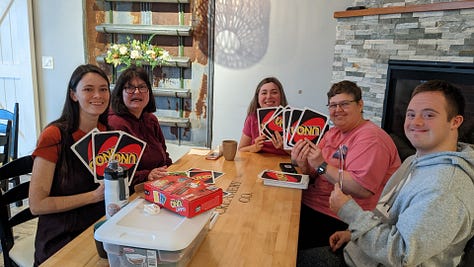
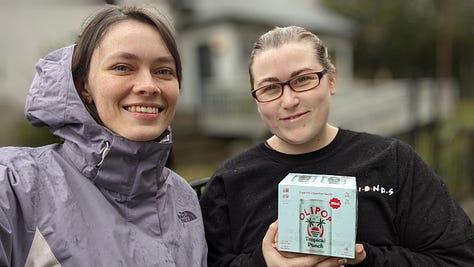
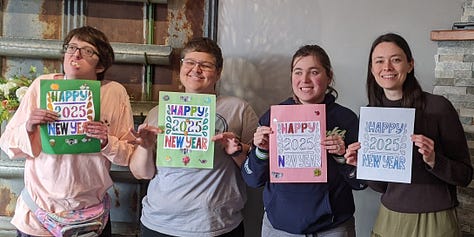
By everyone I mean every healthy individual, no scammers trying to take advantage of my people please!!



